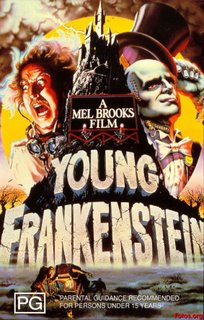 I find a natural resistance rising within me when I see “Blazing Saddles” referred to as an important achievement. I guess it’s because that kind of implies a substantial amount of artistic merit. The picture DID thumb its nose at a lot of longstanding taboos – and proved a big box-office success. But, to me, rating it as an important achievement is something like tossing a brick through a plate glass window and calling it “renovation”. The brick-tossing may qualify as a political statement. Perhaps even leading to the installation of a better window. But there’s no inherent beauty in the act itself. “Blazing Saddles” may indeed have ushered in a climate where new freedoms could be used creatively and constructively. That I can just about concede. But, for me, the picture’s crude, poorly executed and unfunny. And its real legacy is more likely the long line of dumb-ass gross-out comedies that have slithered down the pike in the years since. Having said that, let me hasten to add that from all aspersions cast on “Blazing Saddles”, I hold Madeline Kahn totally exempt. By dint of her own unique and considerable genius, she consistently rises above the drek.
I find a natural resistance rising within me when I see “Blazing Saddles” referred to as an important achievement. I guess it’s because that kind of implies a substantial amount of artistic merit. The picture DID thumb its nose at a lot of longstanding taboos – and proved a big box-office success. But, to me, rating it as an important achievement is something like tossing a brick through a plate glass window and calling it “renovation”. The brick-tossing may qualify as a political statement. Perhaps even leading to the installation of a better window. But there’s no inherent beauty in the act itself. “Blazing Saddles” may indeed have ushered in a climate where new freedoms could be used creatively and constructively. That I can just about concede. But, for me, the picture’s crude, poorly executed and unfunny. And its real legacy is more likely the long line of dumb-ass gross-out comedies that have slithered down the pike in the years since. Having said that, let me hasten to add that from all aspersions cast on “Blazing Saddles”, I hold Madeline Kahn totally exempt. By dint of her own unique and considerable genius, she consistently rises above the drek.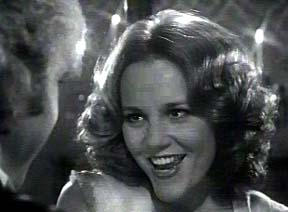 Later that year she added significantly to her laurels in Mel Brooks’ amazing, “Young Frankenstein”. Here, virtually all the elements clicked magically into place. And Kahn’s own brilliance was reflected right back at her from every facet of the production. The picture’s visuals have been widely – and deservedly – praised over the years. Astonishingly evocative sets, eloquent camerawork, witty editing – and of course, the brilliant decision to go with black and white. John Morris, responsible for the flat-footed music in “Blazing Saddles”, here offers a score that originally may have been intended as affectionate over-the-top parody but is actually overtaken by its own genuine loveliness. A case similar to the genesis of Cole Porter’s song “Wunderbar” (from “Kiss Me Kate”), conceived as a satire of schmaltzy operetta waltzes but suffused with so much stand-alone beauty, it’s become a classic.
Later that year she added significantly to her laurels in Mel Brooks’ amazing, “Young Frankenstein”. Here, virtually all the elements clicked magically into place. And Kahn’s own brilliance was reflected right back at her from every facet of the production. The picture’s visuals have been widely – and deservedly – praised over the years. Astonishingly evocative sets, eloquent camerawork, witty editing – and of course, the brilliant decision to go with black and white. John Morris, responsible for the flat-footed music in “Blazing Saddles”, here offers a score that originally may have been intended as affectionate over-the-top parody but is actually overtaken by its own genuine loveliness. A case similar to the genesis of Cole Porter’s song “Wunderbar” (from “Kiss Me Kate”), conceived as a satire of schmaltzy operetta waltzes but suffused with so much stand-alone beauty, it’s become a classic.The sheer provocative power of Mary Shelley’s 1818 novel has stood the test of time. I’ve studied it in two separate university literature courses over the years – and both times this was the book that prompted the most animated , prolonged and passionate in-class discussion. There’s something elemental here – and Brooks and Wilder found a way to put a comic spin on it while still preserving just enough of the story’s melancholy majesty. Their script is diamond-sharp. Rich and thoughtful. But gut-bustingly funny too. The success ratio of the gags in the picture is really pretty astounding.
The cast, of course, is classic. Gene Wilder’s quirky, endearing presence is a perfect fit, Teri Garr’s the flakiest of strudels (“Put … the …candle … back.”). Cloris Leachman makes domestic gorgon Frau Blucher the centrepiece of a surprisingly hilarious running gag about terrified horses. And of all the actors who’ve played the Frankenstein monster in the movies, only Karloff surpasses Peter Boyle. What happened to HIS nomination? Even a couple of non-castings add to the picture’s overall quality. Thank goodness Brooks regular Harvey Korman didn’t get his hands on the Lionel Atwill role. He’d have mangled it. I’m no great fan of Kenneth Mars. But he rises to the occasion with some very funny line readings:
“A riot ees an ugly theeng – unt I theenk eet ees jest about time ve hed vun.”
Not to mention his deft manipulations of the Hand. And somehow Mel Brooks resisted the temptation of grabbing a role for himself. As it is, the Borscht Belt schtick bubbles along at just the right pace.. And putting Brooks, with his inherently pushy, abrasive onscreen persona, into the mix might possibly have gummed things up a bit. But he wisely concentrated all his energies off-camera – and to tremendous effect. “Young Frankenstein”’s his masterpiece.
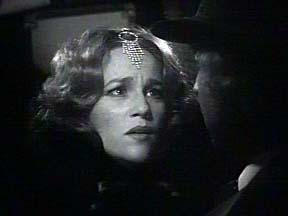 Which brings us to Madeline Kahn’s Elizabeth, one of cinema’s perfect creations. No matter what scene she’s in, no matter which moment you catch, she’s mind-blowing. Ridiculous. Sexy. Ridiculously sexy. We see her first at the train station, swathed in furs. Playing an epic goodbye scene as if she’s on a teeter-totter. She doesn’t just march to her own drummer. There’s a whole roof-garden dance band playing in her head – to alternating rhythms of “come and get me” and “touch-me-not”. A smorgasbord of conflicting signals. And even with “Keep off” signs flashing all over her (“hair … lips … nails …taffeta”), she’s constantly promising earthly delights, constantly saving herself – this particular time for “that party at Nana and Nicky’s”.
Which brings us to Madeline Kahn’s Elizabeth, one of cinema’s perfect creations. No matter what scene she’s in, no matter which moment you catch, she’s mind-blowing. Ridiculous. Sexy. Ridiculously sexy. We see her first at the train station, swathed in furs. Playing an epic goodbye scene as if she’s on a teeter-totter. She doesn’t just march to her own drummer. There’s a whole roof-garden dance band playing in her head – to alternating rhythms of “come and get me” and “touch-me-not”. A smorgasbord of conflicting signals. And even with “Keep off” signs flashing all over her (“hair … lips … nails …taffeta”), she’s constantly promising earthly delights, constantly saving herself – this particular time for “that party at Nana and Nicky’s”.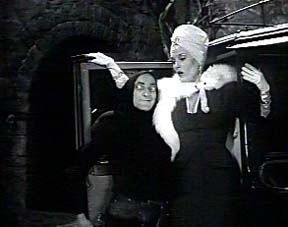 When she shows up at the castle – Peggy Lee profile and white turban – she launches into a little comic chamber music with Wilder, Garr and Feldman. She coos. She vibrates But at any given moment, it’s quite impossible to tell whether she’s a cello, a theramin or a didgeridoo. What IS undeniable though is the electric charge running between her and her three colleagues. It’s Frankenstein’s lab all over again - with every mechanized pinwheel spinning and crackling. The bedroom scene with Wilder displays her come hither/don’t try it routine in full glory. She even makes baby talk work. And who else can do that?
When she shows up at the castle – Peggy Lee profile and white turban – she launches into a little comic chamber music with Wilder, Garr and Feldman. She coos. She vibrates But at any given moment, it’s quite impossible to tell whether she’s a cello, a theramin or a didgeridoo. What IS undeniable though is the electric charge running between her and her three colleagues. It’s Frankenstein’s lab all over again - with every mechanized pinwheel spinning and crackling. The bedroom scene with Wilder displays her come hither/don’t try it routine in full glory. She even makes baby talk work. And who else can do that?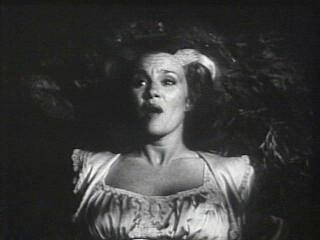 Of course, once she’s had the Elsa Lanchester make-over, she takes us on a really wild ride. Her eyes have definitely seen the glory – not to mention her hair. The post-coital cigarette, the “you men are all alike” tirade. And the honeymoon. Still with the baby talk. But now there’s a side-order of hissing steam heat to go with it. How on earth do you pick a favorite Kahn moment in this film?
Of course, once she’s had the Elsa Lanchester make-over, she takes us on a really wild ride. Her eyes have definitely seen the glory – not to mention her hair. The post-coital cigarette, the “you men are all alike” tirade. And the honeymoon. Still with the baby talk. But now there’s a side-order of hissing steam heat to go with it. How on earth do you pick a favorite Kahn moment in this film?“Would you want me like this – now - so soon before our wedding – so near we can almost touch it?”
Yes, Madeline, we want you now.
1 comment:
I clearly have to revisit this movie, since I think I short-changed it the first time I saw it. That said, I'd stump for Gene Hackman's witty take on the blind mendicant in the woods, and my favorite performance in the movie (at least as I remember it) is Leachman's, possibly for the single scene that climaxes with, "Yes!... YES!... He! Was! My! BOYFRIEND!"
Post a Comment